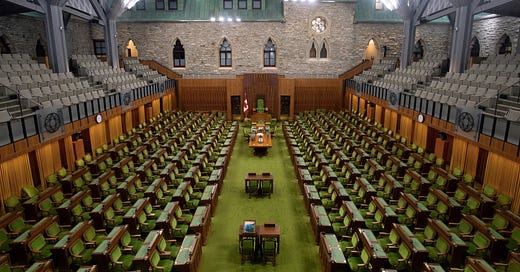Issue 24: Politics, the pandemic, and the professional class
The COVID-19 crisis has given rise to the sort of rule-by-experts that the professional class has long seen as preferable to mere politics. It's a dangerous development
Policy for Pandemics is produced and edited by Andrew Potter and co-edited by Charlotte Reboul and Paisley Sim (bios here). Today’s special afternoon briefing is by Philippe Lagassé (PL),who is associate professor and the Barton Chair at the Norman Paterson School of International Affairs at Carleton University.

COVID-19 is highlighting the importance of evidence and expertise in policymaking and democratic government. The pandemic has brought experts to the centre of decision-making and government communications in Canada. Public trust in these experts is high and has helped flatten the curve. Canadian governments of all stripes have embraced public health officials, and few have questioned the wisdom of following their prescriptions. Those few politicians who have critiqued these experts, or engaged in crass partisanship in these exceptional times, have been roundly disparaged.
For all the death and economic devastation, the pandemic has made room for an elusive ideal of democracy, one where ideas, not factions, compete to shape government policy and evidence adjudicates between them. Expertise and data rule, unburdened by the shallowness of the communications strategies, wedge issues, fearmongering, muckraking, and partisan theatrics, including those in Parliament.
This ideal holds particular sway among members of the professional class: academics, lawyers, economists, doctors, pundits, and civil servants of a centrist, small-l liberal persuasion. This is perhaps not surprising, since they’re heavily represented among those who have policy-relevant expertise. Yet this is more than self-promotion; the ideal rests on the possibility of achieving objectively defined public goods, and of finding an equilibrium between competing interests and demands. Often tagged as ‘elitist’ by the populist right, and ‘neoliberal’ by the critical left, the pandemic has temporarily silenced most skeptics of this rationalistic vision of democratic government.
An important characteristic of this way of thinking, however, is that it’s a shade more technocratic than democratic. The emphasis is less on government by the people than by the knowledgeable. Indeed, we find within this worldview an echo of the ancients’ worries about the demos and demagogues. This, in turn, leads to a strong emphasis on the liberal in liberal democracy, and a counterbalancing of democratic excesses by technocratic expertise. Hence, there is an emphasis on the wisdom of the judiciary over the whims of elected representatives, on the professional public service not only advising and implementing but speaking truth to power, and on the importance of merit over loyalty in public appointments.
In normal times, of course, precedence is still given to popular democracy and the baser forms of politics that animate it. The consent of the people is primordial, even if it has to be secured through electoral campaigns that are light on policy and heavy on rhetoric, meatheaded partisan attacks, and gotcha media coverage. Similarly, the essentiality of Parliament isn’t in normal times called into question, though the vacuity of question period and many committee hearings are always lamented. And despite the centrality of expertise and evidence for adherents of this ideal, the principle that politicians have a right to be wrong is grudgingly accepted.
COVID-19, however, has exhausted the patience certain members of the professional class have with politicking, partisanship, and the parliamentary settings that allow them to flourish. Although the governing party only has a plurality of seats, and ministerial accountability relies on a partisan government-opposition dynamic, a fair number of voices insist that this is not the time for Parliament to sit or for political parties to play their usual role. To suggest otherwise is to be tone deaf, unserious, or irresponsible. Until the pandemic is over, we are told, base politics needs to be put on hold, lest it distract us from the crisis at hand and the expert advice we need to get through it.
There is a lot going for this view, but it should make us a bit uncomfortable, especially those of us who belong to the professional class and subscribe to the rationalistic vision of government many of its members champion. The speed with which popular politics and Parliament can be silenced should give us pause. Partisan politics and representative institutions remain the bedrock of Canadian democracy. Although it’s tempting to think that the ideal of democracy as exchange of expertise and evidence is a sufficient substitute, this betrays a certain vanity and hubris of the sort that has felled technocrats in the past. Unless there is an absolutely compelling reason to exclude them, popular politics and representative democracy must be given their due. (PL)

Read: A piece of fantastic science journalism, about how the story of why the dinosaurs went extinct was discovered
Drink: Stanley Tucci made a negroni and everyone went nuts. Negroni are good tho
Follow: The Instagram page for the amazing artist Sara Paglia (h/t Alheli Picazo)
Watch: Yoyoka, the ten year old Japanese drumming sensation!



